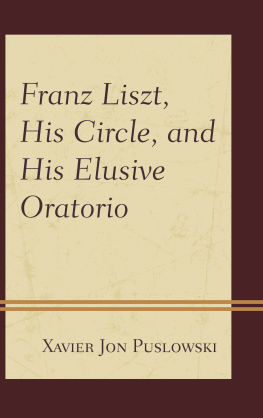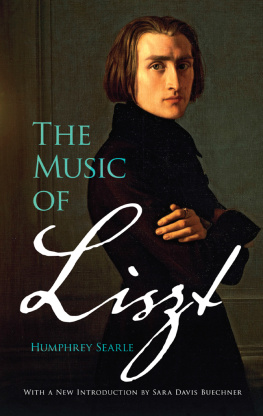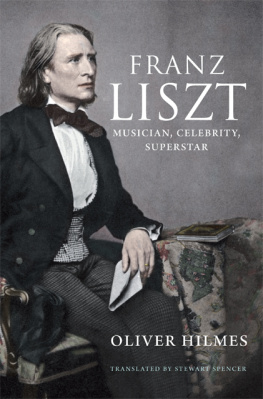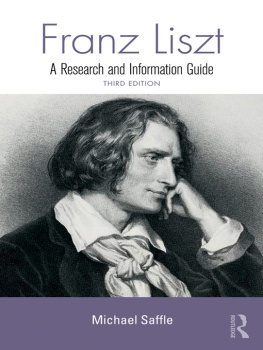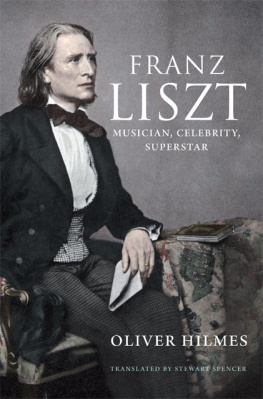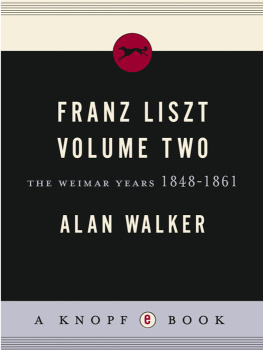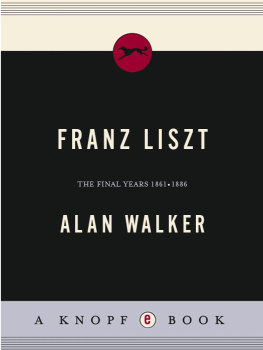Hall-Swadley - The Collected Writings of Franz Liszt, Vol.2
Here you can read online Hall-Swadley - The Collected Writings of Franz Liszt, Vol.2 full text of the book (entire story) in english for free. Download pdf and epub, get meaning, cover and reviews about this ebook. year: 2011, publisher: Scarecrow Press, genre: Art. Description of the work, (preface) as well as reviews are available. Best literature library LitArk.com created for fans of good reading and offers a wide selection of genres:
Romance novel
Science fiction
Adventure
Detective
Science
History
Home and family
Prose
Art
Politics
Computer
Non-fiction
Religion
Business
Children
Humor
Choose a favorite category and find really read worthwhile books. Enjoy immersion in the world of imagination, feel the emotions of the characters or learn something new for yourself, make an fascinating discovery.

- Book:The Collected Writings of Franz Liszt, Vol.2
- Author:
- Publisher:Scarecrow Press
- Genre:
- Year:2011
- Rating:3 / 5
- Favourites:Add to favourites
- Your mark:
- 60
- 1
- 2
- 3
- 4
- 5
The Collected Writings of Franz Liszt, Vol.2: summary, description and annotation
We offer to read an annotation, description, summary or preface (depends on what the author of the book "The Collected Writings of Franz Liszt, Vol.2" wrote himself). If you haven't found the necessary information about the book — write in the comments, we will try to find it.
The Collected Writings of Franz Liszt, Vol.2 — read online for free the complete book (whole text) full work
Below is the text of the book, divided by pages. System saving the place of the last page read, allows you to conveniently read the book "The Collected Writings of Franz Liszt, Vol.2" online for free, without having to search again every time where you left off. Put a bookmark, and you can go to the page where you finished reading at any time.
Font size:
Interval:
Bookmark:
Janita Hall-Swadley obtained her Bachelor of Music degree in Music History, specializing in the music of Robert Schumann, with a minor in Piano Performance from The Florida State University. She continued her music studies at The Boston Conservatory, where she received a Master of Music degree in Music History with her thesis Organicism in the Structure and Form of Franz Liszts Symphonic Poems. Thereafter, she moved to Denton, Texas, to attend the University of North Texas as a doctoral candidate in musicology, with a secondary focus in nineteenth-century philosophy. She began translating Liszts writings while working nights at the Attorney Generals Office for the State of Rhode Island, and she later served as a contract linguist in the German language for the U.S. Government. In 2007 she gave up her job in the private sector to work full time on Liszts essays. The series The Collected Writings of Franz Liszt is her first book-length attempt at publication in the fields of musicology and German language studies.
As a graduate and postgraduate student, Hall-Swadley has presented her studies at international conferences, such as the University of Helsinki in Finland and the Hochschule fr Musik Franz Liszt in Weimar, Germany. She received the FCCJ Public Speaking Award for her presentation about the life and music of Beethoven. She was also offered a Fulbright in Middle Eastern studies (not taken) in 2001. Shortly before the late composer Karlheinz Stockhausens death, she traveled to Krten, Germany, to work with Stockhausen and crew in the interpretation of his music. Dfte/Zeichen [Scents and Signs] from the last day, Sonntag [Sunday], from Stockhausens opera Licht [Light] is dedicated to her.
She is currently living in Parkin, Arkansasthe site of Hernando de Sotos encampmentwith her husband Ben, two Maltese dogs, Rexie and Riba, a Golden Retriever named Ramsay, and a Siamese cat lovingly referred to as Soi. In addition to translating, she is preparing repertoire for upcoming international piano competitions.
It is the supreme art of the teacher to awaken joy in creative expression and knowledge.Albert Einstein.
I am doing what I really love. Twenty years ago I could not have said that. I was working four jobsa full-time single mother of three, part-time manhole rehabilitation worker, interior decorator, and security officerbut I still was not making it. I can remember sitting at the kitchen table with my check book after the children went to bed, and I sunk my head in exasperation. There simply was not enough left over to pay everything in front of me, and I was entirely spent and possibly more depleted, both mentally and physically, than my checking account. I sat there, staring at the wall, and I tried to figure out how to get out of my dead-end situation. As I stared at the wall, something started to take shape before my eyes. It was a piano. It was then that I remembered the last time that I was truly happy. It was fourteen years earlier. At that time, I was still living with my parents, and I was able to spend endless hours at the piano, playing my heart out. This was nostalgia at its best. As an adult, of course, I no longer had those endless hours, but the desire to be happy and fulfilled is not something that goes away with age or maturity. I had to find a way to make the most out of what I did have. But how? I could not even remember how to read notes anymore.
A week later, I had exactly two hours to myself. I spent the time at a thrift store, mostly searching for a new family room chair. The last one had literally fallen apart from wear. I had $25 to spend, but I was not finding anything for that price that looked even slightly safe enough for my children. I was almost at the exit door before something caught my side view. There was a piano off to my right. It was pretty banged up, most of the keys were missing their ivory, and I was informed that the sound board was split and the instrument would not hold a tuning. I didnt care. The clerk accepted my $25 for the piano, she threw in the bench for nothing, and delivery was free. When the piano arrived a few days later, I sat down and began pushing down the keys, one by one, and in no specific order. It sounded terrible, but at the same time, I could not remember when I felt so good.
I had forgotten how to read music, and my limited free time excluded the possibility of teaching myself. But I began checking out recordings from the public library, and I tried to match the tones that I heard. Mozarts music was easy for me to copy, and I particularly liked his set of variations Ah, vous dirai-je, Maman! (K. 265), better known by many as Twinkle, Twinkle Little Star. I played it over and over until I sounded just like the recordingor so I thought. I had also checked out a recording of Michael Nymans film music for the movie The Piano, and I began playing the theme song, The Promise. I loved this piece, and not just for the beautiful tones. In the movie there is a scene where Holly Hunters character stares out the window at her piano as it stands on the beach. She was mute, and the only way she could speak was through the piano. The hunger in her eyes as she stared out the window haunted me. I recognized that look. It was me. I knew at that point I had to devise a way to learn how to know the music again so that I could hear my voice.
The local newspaper announced piano auditions for the community college in my city. The flyer said that music scholarships were offered to those who qualified, and it was then that I saw my path. I only knew two piecesMozarts Ah, vous dirai-je, Maman! and Nymans The Promiseso I worked diligently on them, and I auditioned. I passed. I was offered not only tuition, but enough money for living expenses and books so that I could quit my jobs and focus on the music. There was only one problem; I still could not read music. I knew, however, that if my piano teacher found out my little secret, my dream would turn into a nightmare. Lucky for me, my private instructor only assigned me two additional pieces that semestera Bach two-part invention and Beethovens Rondo in G Major. I waited until the end of the semester to play the new pieces, so I had the time to perfect them enough to cover myself. My teacher was also so appreciative that I always came to my lesson with my pieces already memorized. She still had not realized that I could not read music. I actually made it through my juries and halfway into the next semester before my secret was out. My teacher had assigned me a Chopin etudewhich, by the way, is nearly impossible to replicate by ear, or so I found outand during a lesson, I was not playing some of the right notes. She stopped me and then asked me to play two specific measures. I could not do it. She looked me squarely in the eyes and said, You cant read notes, can you? I shook my head. She could have very easily kicked me out of her studio. Instead, she required me to come to her office twice a week to learn how to play scales and read music. It was so hard, but she got me through it. Thank you, Ileana Fernandez, for giving me back my voice, my life.
Since then, I have had the pleasure of being taught by the best teachers anyone could want. Leonidas Lipovetsky and his middle-of-the-night phone calls about Conan OBrien still give me endless piano material to draw from (who would figure?), and Norma Mastrogiacomos little tap dance was incredibly helpful in teaching me those difficult rhythms. The beautiful voice of Charles Brewer, my singing musicologist, inspired me to learn the intricacies of medieval chant. I will never forget Les Brothers as he danced with his light stick. It was so much fun! Every time I hear Don McLeans American Pie, I think of Michael Coopers lecture on the social and political implications in the music. There were so many creative people who motivated, pushed (and sometimes prodded), inspired, and intrigued me along the way. Even those who were exceptionally adverse still encouraged me to learn to become bettereven for no other reason than to prove them wrong. This is all to say that I am so lucky to have learned from such wonderful and creative teachers. Thanks to all of you.
Font size:
Interval:
Bookmark:
Similar books «The Collected Writings of Franz Liszt, Vol.2»
Look at similar books to The Collected Writings of Franz Liszt, Vol.2. We have selected literature similar in name and meaning in the hope of providing readers with more options to find new, interesting, not yet read works.
Discussion, reviews of the book The Collected Writings of Franz Liszt, Vol.2 and just readers' own opinions. Leave your comments, write what you think about the work, its meaning or the main characters. Specify what exactly you liked and what you didn't like, and why you think so.

